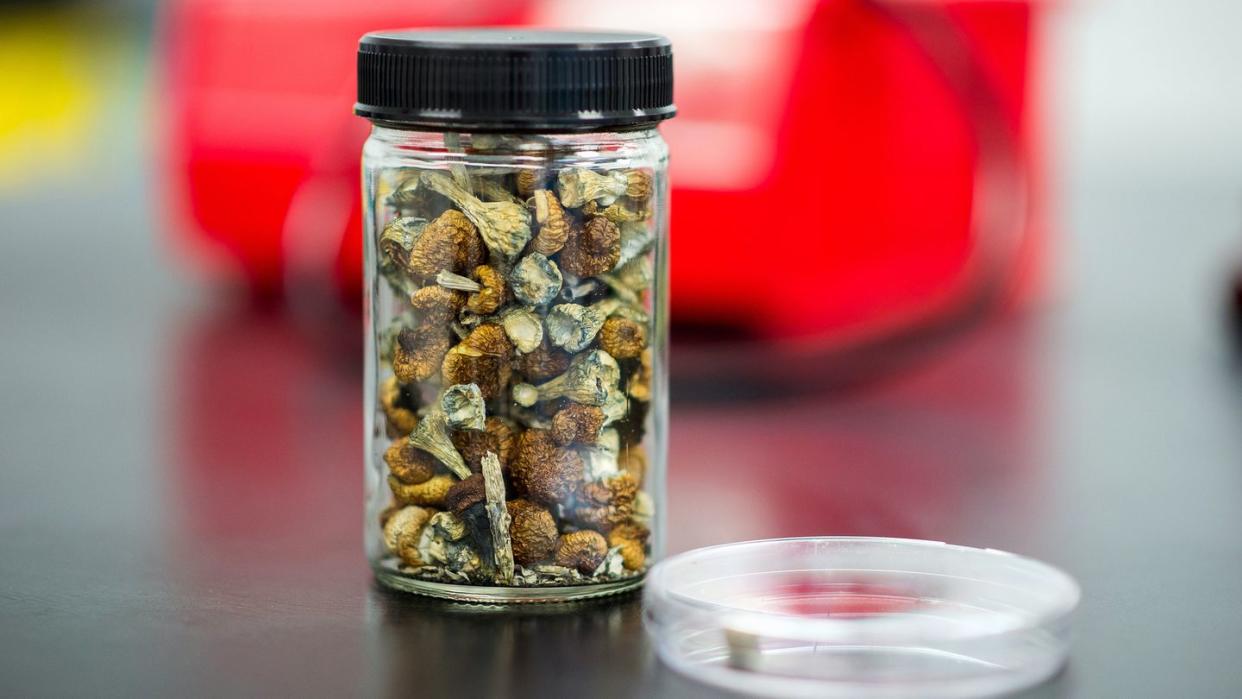Can Microdosing Mushrooms Actually Improve Mental Health?

"Hearst Magazines and Yahoo may earn commission or revenue on some items through these links."
THERE’S BEEN A LOT of talk about microdosing psychedelics lately as a way to improve mental health.
While research is ongoing, some early studies have shown that the substances could be as effective as some traditional treatments for anxiety and depression. But experts say more research is needed on the subject to truly establish its mental health benefits.
Psychedelics are also illegal in much of the U.S., but some states have started to decriminalize their use.
Still, people are interested in trying them. More than half of Americans say they’re open to trying psychedelic medicine, according to a survey by Mindbloom, a ketamine treatment provider.
“This is just the beginnings of a very exciting field of work,” says Vivian Tsang, M.D., a psychiatrist, adjunct professor at Vancouver Island University, and a research lead at Roots to Thrive, a nonprofit healthcare practice in Canada that’s devoted to ketamine- and psilocybin-assisted therapy. “There are great teams of researchers doing a lot of work on this.”
Microdosing refers to taking a smaller amount of a typical dose of a psychedelic, such as psilocybin (or magic mushrooms), LSD, ketamine, or MDMA, Dr. Tsang explains. However, mushrooms tend to be the most common psychedelic used in microdosing, since much of the research has been done on them.
Microdosing mushrooms is generally safe for most people and doesn’t have addictive qualities, she says. But it’s best to do it under the guidance of an experienced health professional.
Here’s an overview of what’s considered a microdose, the potential mental health benefits of microdosing, and other things you should know about it.
What Is Microdosing?
There isn’t really a standard microdose measurement, but Dr. Tsang says it’s usually about one-tenth of what would be considered a typical dose (that might be used for recreational purposes).
“This can allow you to take advantage of the potential benefits of psychedelics without experiencing their full psychedelic effects, like hallucinations,” says Stacia Woodcock, PharmD, a pharmacy editor at GoodRx.
The mushrooms used in microdosing contain psilocybin, a natural chemical that can have mind-altering or hallucinogenic effects. Woodcock says psilocybin has been used for recreational or religious purposes for centuries.
Unless you’re working with a healthcare professional to take psychedelics, it can be tough to know how much you’re actually taking, she adds. Since these substances are illegal in the U.S., they’re not regulated and may contain more than a microdose—and, that could bring some side effects.
How Microdosing Works
Psilocybin mushrooms can be consumed dried, in capsule form, or infused in teas or other products, Dr. Tsang says.
Because the dose is so small, you usually won’t experience any hallucinations or sensory changes, she explains. Those effects often come with macrodosing.
However, many people who microdose report feeling a heightened sense of awareness, focus, energy, or creativity, Dr. Tsang adds.
“At the microdosing level, you should be able to move about your day in a safe way and be able to go to work or school,” she says.
Under medical supervision, you might be advised to microdose every three days or a few times a week, depending on how you respond, Woodcock says.
The Benefits of Microdosing
Research on the mental health benefits of microdosing mushrooms is still in the early stages, and some of the findings have been mixed.
A 2021 study published in the New England Journal of Medicine found that psilocybin therapy was just as effective as traditional antidepressant treatments for moderate to severe depression. But, some participants reported higher anxiety and lower mood after microdosing.
Other research suggests psilocybin may also help treat substance use disorders, depression, anxiety, PTSD, and OCD.
More research is needed to provide more evidence on the potential benefits of microdosing mushrooms—especially randomized controlled trials, which are the “gold standard in research,” Dr. Tsang says.
Some researchers suggest that psychedelics like mushrooms work best when they’re part of a comprehensive treatment plan that includes therapy and guidance from a trained mental health professional, Woodcock says.
Many of the benefits of microdosing psilocybin have been from small anecdotal studies, but suggest it can improve mood, attention, and creativity. It may also improve cognitive function or help reduce excessive drinking.
Is Microdosing Legal?
Psychedelics are illegal in the United States, Woodcock says. But, there’s a growing movement to legalize or decriminalize psychedelics.
In 2022, Colorado voters approved a measure to legalize psilocybin, and the state has already taken steps to decriminalize it. Oregon has legalized the use of psilocybin via licensed service centers.
It might be possible to purchase psilocybin online or elsewhere, but these products may not be safe, Woodcock says. It’s tough to know how much of the psychedelic or other ingredients the products contain.
What Are the Risks?
True microdosing is generally safe for most healthy people, Dr. Tsang says.
But sometimes you might unknowingly be taking more than what’s considered a microdose, especially if you’re using psychedelics without supervision or guidance from a medical expert, she adds.
If you take a full dose of psilocybin, you could experience hallucinations, nausea, vomiting, dizziness, or high blood pressure, Dr. Tsang says.
You Might Also Like

